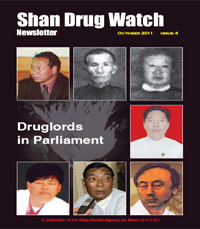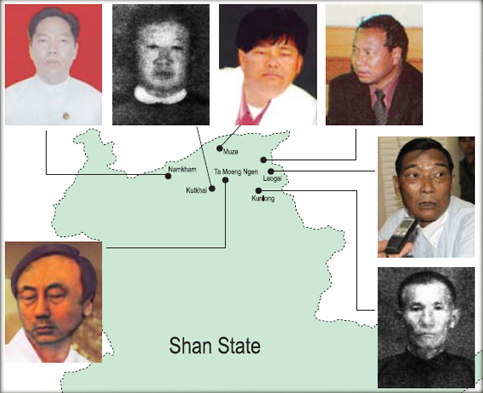One of the 3 main plots of ‘Traffic’, the Oscar-winning movie in 2001, was about a general who was waging war against a drug cartel in Mexico. Applauded by the Americans at first, he was later found out to be working for a rival cartel.
 In Burma, the plot is being played again and again by the country’s rulers. The only difference is that while the Mexican general was exposed and sent to jail, his counterparts in Burma are still getting away with it.
In Burma, the plot is being played again and again by the country’s rulers. The only difference is that while the Mexican general was exposed and sent to jail, his counterparts in Burma are still getting away with it.
They had used Khun Sa against the Kuomintang, later the Wa against Khun Sa, and now the militias created by them against the Wa. The surprising thing is the worn-out strategem still works and the generals are still getting international support for not doing the job.
That was the picture the authors of the Shan Drug Watch had been trying to portray since Show Business, their first report in 2003.
The latest one, Shan Drug Watch 2011, also sticks to the original theme. It however has a curious twist:
In their attempts to canvass votes from the local people, many candidates from the military’s proxy party, Union Solidarity and Development Party (USDP), better known as the Lion Party for its logo, had promised farmers would be allowed to grow poppies without fear of persecution. The result was the upsurge of production and output in Burma’s Shan State, especially in the north, where at least 7 of the militia leaders were “elected”:
1 as an Upper House representative
2 as Lower House representatives, and
4 as Shan State Assembly representatives
leading to the saying, “The army gets (opium) taxes and the lion gets votes.”
While nobody’s sure whether it was a deliberate flounce of their own 15 year master plan to eradicate opium production, reports coming from all three parts of Shan State confirmed that the weather, both seasonal and political, had been favorable:
Out of 55 townships there, 45 were confirmed as poppy growers and 5 as non-growers (4 Wa and 1 Mongla).

Only 5 townships remain arguably free from poppy fields.
Apart from Shan State, opium poppy is also grown in Kachin, Karenni (Kayah), Arakan and Chin states and Sagaing, Mandalay and Magwe divisions (now renamed regions).
It seems clear that as long as the country’s rulers are making war on their own people, they will need more troops and allies (those that can be bought with drug licenses). More troops and allies mean they will continue to be a heavy burden to the populace who are required to feed, clothe and pay them.
The only way out of it will be a national reconciliation built on the trust of the people, especially the non-Burmans, who have been calling upon successive rulers to honor the 1947 Panglong Agreement that had created a merger with the lowland Burma. Its promises: autonomy in internal affairs, human righs and democracy must be fulfilled.
Shan Drug Watch 2011 can be read in www.shanland.org. If the reader would like it in print, please write to Email: [email protected]


